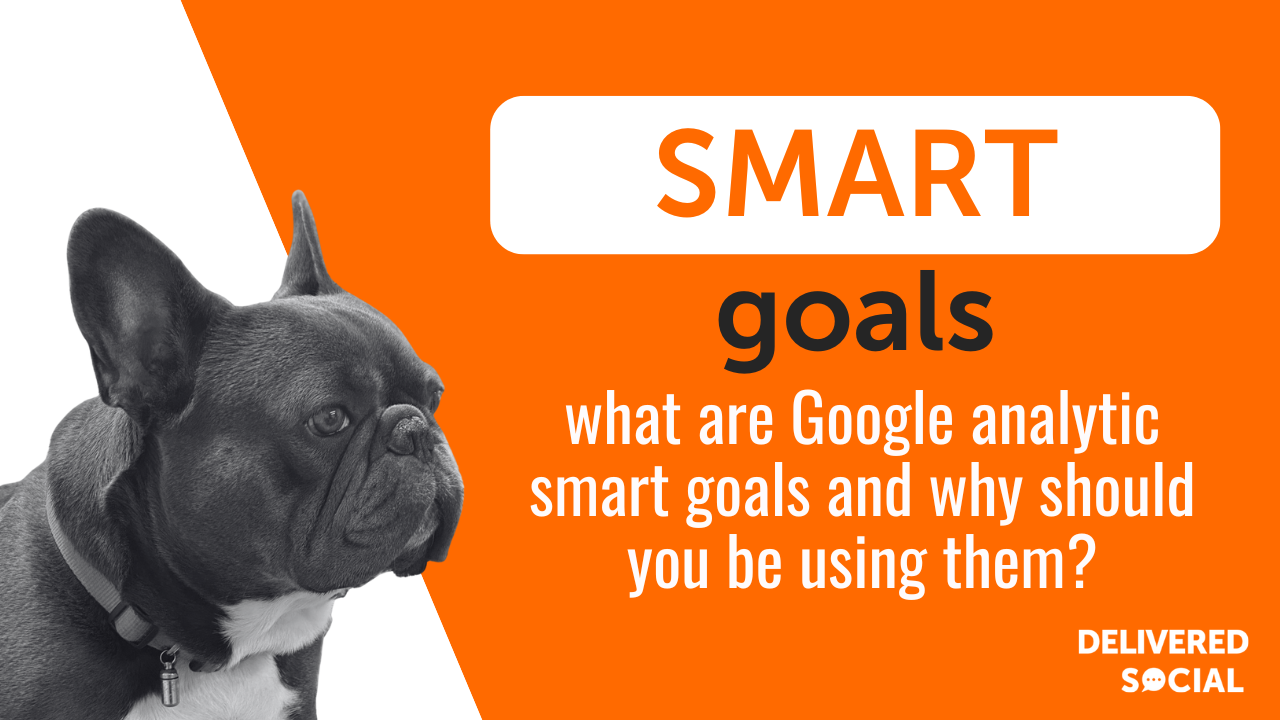
Whilst monitoring traffic is important, it is imperative we go one step further and actually measure the end goals of your website to understand how effective your online marketing truly is. It can however be difficult if your desired outcome isn’t a simple download, subscription or purchase that can easily be set up using a tracking service. However, there is an answer to this bump in the road! Google Analytics Smart Goals is not only one of our favourite features, but it can also assist your business to overcome the issue of tracking only ‘hard’ aims.
Today, we’ll be taking you through Google goals and highlighting exactly why you should be using this fantastic resource, no matter your business size. Whilst setting goals in Google Analytics and interpreting this data may seem daunting for the beginner marketeer, it’s an invaluable tool that will continue to develop and serve you long-term, automatically. Although, these smart targets may not suit every business, so let’s uncover if these could work for you…
What are Smart Goals and how do they work?
The goals feature in Google Analytics is the result of machine learning algorithms, and looking at these signals the platform determines what a ‘valuable’ user may look like to your business. As the name may suggest, these objectives are pretty clever! Utilising this data, you’ll then be able to optimise not only your website but also your paid ads.
Google states “Each session is assigned a score, with the “best” sessions being translated into Smart Goals. Some examples of the signals included in the Smart Goals model are Session duration, Pages per session, Location, Device and Browser.”
These are all examples of engagement metrics, and the top-rated of these will be shown to you. But remember, the conversion metrics such as average order value, customer lifetime value, sales increases and cost of engaged users will not be measured – this tends to be essential information for e-commerce businesses.
Therefore, for those who cannot measure specific conversions, these ‘best’ sessions will provide you with a solution. You’ll be able to measure user patterns and interpret how your marketing strategy affects these Google Analytics Smart Goals, optimising accordingly.
It’s very simple to start using this tool; rather than having to go through the procedure of setting up the desired outcome manually, you just need to ‘switch on’ the feature! However, to be eligible for this service your website will have needed to receive 500 clicks over the past 30 days.
[code_snippet id=6]Setting up goals in Google Analytics
Want to start using this tool straight away? Follow these quick steps (note that you’ll need to have the correct permissions to do so):
- Sign in to Google Analytics
- Click Admin, and navigate to the desired view
- In the view column, click Goals
- Click + New Goal
- Select Smart Goal
- Give your objective a name and click Save
- No additional configuration or customisation is required (no wonder they’re called smart!)
It’s recommended you allow the Google Analytics Smart Goals to run for a few weeks before optimising your website or ads to ensure there is sufficient data to back up these suggestions.
Why use Google Analytics Smart Goals?
Of course, it’s important to note that this tool will not suit every business. For those that can easily measure their website’s end outcome, we would suggest you steer clear and focus on these specific conversions results.
Smart Goals Google Analytics is ideal for advertisers looking to automate their bidding process using marketing strategies such as Target CPA, even if they don’t have ‘hard’ data to follow. The smart targets will determine valuable actions and behaviour on your website, which in turn can ensure you automatically bid on strategies that will drive valuable traffic to you.

Limitations of the feature
#1 Smart Goals are not configurable or customisable
You are unable to edit and amend these targets as they follow Google’s own machine learnt algorithm. Whilst this can be useful, it can also mean you don’t fully understand what it is the platform is measuring as these best sessions are not explained to you as the viewer. Simply put, you are interpreting anonymous data.
#2 Using your allotted slots
Using Google Analytics, you can set up to 20 different outcomes to track, monitor and measure. Smart Goals will take one of these slots, which may not be an issue but you should consider if this truly adds value to your data. Furthermore, you are only able to have one smart goal per view.
#3 If your clicks drop the tool is disabled
If your website traffic dips below the 500 click threshold across the last 30 days, this feature will be temporarily disabled until it picks back up again. This could mean you miss out on important data collection and have inconsistent results, traditional goals however do not have the limitation.
How to use Smart Goals for your marketing strategy
It has been dubbed the less sophisticated option for advertisers, however, you can utilise your analytics goals very effectively on Adwords. There are countless businesses out there without any conversion tracking in place, yet pay for clicks every month – shooting in the dark and guessing what may be effective. Digital marketing is ideal for actually tracking and measuring successful methods, but many of us still aren’t taking advantage of the resources available. By using smart goals, you can automatically bid for words that Google knows will lead to an increase in your search results.
Usually, CPA bidding relies on historical data which is why it works so well for campaigns that have tracked a good amount of quality conversions for a while. If you link your AdWords and Analytics accounts and import the smart goal into AdWords, the conversion optimization relies on the data that Google has collected from thousands of websites. Simply put, it won’t matter if you have little previous data as the platform will use the data collected from thousands of similar sites within your industry.
And whilst a correctly set-up and professionally managed traditional conversion tracker will out-perform these smart goals, if the alternative is having no tracking in place then you should consider implementing this feature. It is vital, however, you do not ‘set and forget’ on the platform, you should be continually analysing and developing new tactics to grow your business’ online presence.
Should you be using Google Smart Goals? The conclusion
There is no definitive answer to whether or not you should be using this tool, but it boils down to two basic questions: what are your business goals? and, can you measure them accurately? Google algorithm-based feature can be ideal for those that struggle to measure end outcomes on their website, but understand that using Google Analytics Smart Goals, only Google will know what the ‘high-quality’ session is. So, you may be led blindly, following data that isn’t necessarily going to provide you with results.
Should you choose to use this feature (and even if you don’t!), remember to always analyse and monitor the data you gather – don’t set and forget! Interpret and understand the patterns revealed to optimise your marketing strategy.
Are you still feeling a little lost and need some advice on how best to use Google Analytics? Or want to talk about digital marketing strategies? Speak to one of our expert team today, just email us at hello@deliveredsocial.com and we’ll be happy to help.
Interested In Working Together?
Introducing Delivered Social. We’re The Most-Rated Digital Agency In Surrey & Hampshire – We’ve Got To Be Doing Something Right.
Delivered Social is a digital marketing agency with one mission—to help businesses grow. We’re famous in Guildford and Portsmouth for our social clinics. We believe in free advice. We build lasting relationships because our team prides itself on being helpful, which our clients appreciate.
If you are looking for a new website or an agency to manage your social media presence, we can help.
If you need something slightly different, here's a super handy list of all our services, or you can always email us.



















